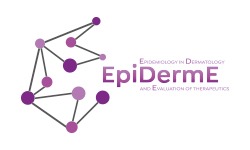
Epidemiological research is the branch of science that allows the analysis of the factors that influence the frequency or distribution of diseases and other health problems in populations exposed to these same factors.
It is based on observational studies of specified populations (called "cohorts") over time, either prospectively or retrospectively. It is based on questionnaires and clinical data collection sheets in the studied population. It sometimes analyses the effects of a modification (stop, addition, increase, or decrease) of one (or more) factor(s) (the so-called "interventions") on the studied population: for example, the development of diseases, mortality, etc.
The neurofibromatosis referral centre works with the EpiDermE clinical epidemiology team, and you can also participate in the ComPare cohort.
The referral centre works in collaboration with the EpiDermE team.
Led by Pr. Émilie Sbidian, EpiDermE (Epidemiology in Dermatology and Evaluation of therapeutics), is a pharmaco-epidemiology research team whose two main axes are:
- The benefit/risk assessment of the therapeutics used in chronic inflammatory pathologies.
- Medication errors and serious skin adverse effects of therapeutics.
If you are being followed for neurofibromatosis type 1, you can participate in epidemiological research. Your experience and testimonial are of crucial importance to enable researchers and doctors to improve your quality of life and your treatments.
By sharing your experience, you will help to accelerate medical research on neurofibromatosis type 1. Similar to other patients with different chronic diseases, you can then participate in the ComPaRe online cohort.

